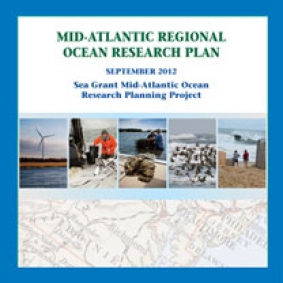Knauss legislative fellowships in Congress help build careers — and they're fun and educational. See our video and fact sheet for details.
Mid-Atlantic Sea Grant Programs Identify Key Ocean Research Needs for the Region

Maryland Sea Grant is a coauthor of a new, multi-state effort to plan priorities for coordinated ocean and coastal research studies in the Mid-Atlantic region. The studies could yield new insights into pressing environmental problems and economic challenges, inform regional management of coastal resources, and support a new science-based national policy on oceans. All of those efforts could aid efforts to preserve the Chesapeake Bay region’s ecology and commerce.
Among the environmental threats facing the region are predicted increases in coming years in rates of sea level rise and extreme storms that could threaten coastal communities. Opportunities for economic development include offshore energy and commercial and recreational fisheries.
To assist proactive management actions on these issues, the research plan calls for studies in five focus areas: climate change, offshore energy, water quality and quantity, ecosystem structure and function, and human dimensions (social science research).
“The Mid-Atlantic Regional Ocean Research Plan is an important step in promoting economic growth and environmental sustainability in the Mid-Atlantic through building an improved understanding of the region’s research needs in ocean and coastal areas,” said Fredrika Moser, interim director of Maryland Sea Grant and a contributor to the plan.
The research plan was completed jointly by the Sea Grant programs of Delaware, Maryland, New Jersey, North Carolina, Pennsylvania, and Virginia and the Gerard J. Mangone Center for Marine Policy at the University of Delaware’s College of Earth, Ocean, and Environment and in cooperation with New York Sea Grant.
The plan was developed based on a comprehensive review of reports and recommendations from across the region. The organizers used stakeholder workshops, an online stakeholder survey, and an open public comment period to focus and refine regional research priorities. They are:
Climate Change: The plan calls for an improved understanding of sea level rise effects on coastal ecosystems, baseline monitoring to better visualize change, and an improved understanding of hazard risks posed by climate change.
Offshore Energy: The plan outlines the need to establish baseline data for environmental impacts, assess the technological feasibility of various energy exploitation approaches, and improve understanding of the socioeconomic impacts of offshore energy.
Water Quality and Quantity: Top priorities include understanding the impacts of nutrient loading and cycling on marine ecosystems, understanding the implications of management decisions, and coordinating water quality monitoring efforts.
Ecosystem Structure and Function: The plan calls for studies on the relationship between land use and ocean ecosystem health, identification of critical habitats in the region, and improved integration and analysis of existing data.
Human Dimensions: The plan addresses social, economic, cultural, and political considerations and highlights the need to better understand community vulnerability and resilience to ocean-related changes, governance and policy effectiveness, and the main drivers of behavioral change in the region.
The four-year project, funded by the National Oceanic and Atmospheric Administration through the Sea Grant Regional Initiative, supports regional and nationwide efforts to inform regional ocean planning in the United States. In particular, the National Ocean Policy, established by Executive Order 13547 in 2010, calls for an improved scientific understanding of ocean and coastal ecosystems to support regional ecosystem-based ocean management. Visit the project's website.
The state Sea Grant programs in the Mid-Atlantic have a long history of collaboration and coordination on regional-scale priorities. Over the last two years, the Mid-Atlantic Sea Grant programs have jointly responded to emerging regional opportunities and supported regional research and outreach efforts on issues such as the human dimensions of sea level rise, invasive species vector management, fisheries, and the risk for swimmers posed by rip currents.
Sea Grant is a nationwide network of 33 university-based programs that work with coastal communities and university networks to foster research, education, and training to support environmental stewardship, long-term economic development, and responsible use of America’s coastal, ocean and Great Lakes resources. See more information on the National Sea Grant Program.
For more information about the Research Plan, please contact:
Dr. Fredrika Moser, Interim Director
Maryland Sea Grant College
4321 Hartwick Road, Suite 300
College Park, Maryland 20740
Tel: (301) 405-7500





